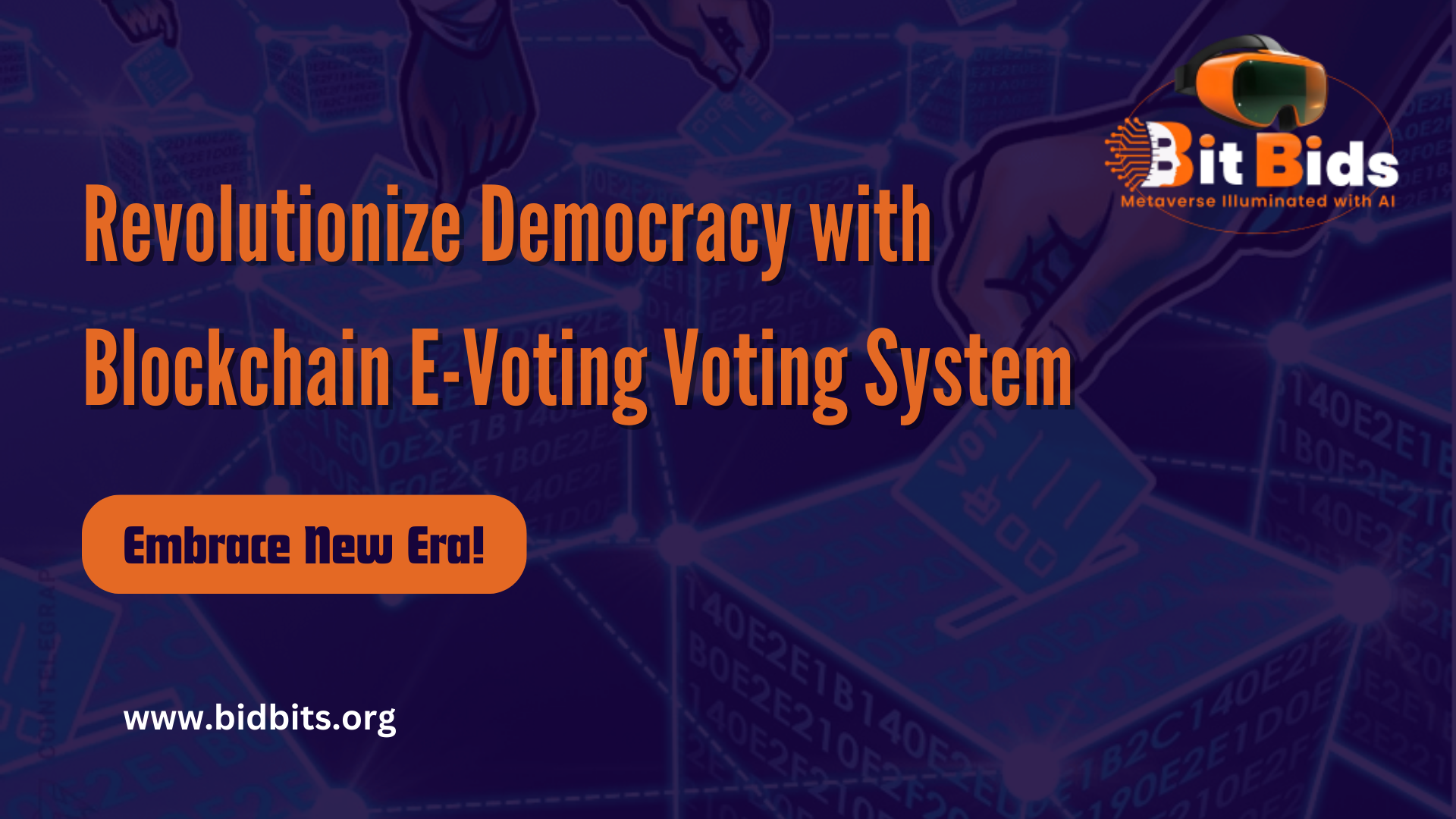Secure Election With A Blockchain Digital Voting System

Elections are the cornerstone of any democratic system, providing citizens with a voice to express their views through the powerful act of voting. The evolution of the election process has been constant, driven by the need for transparency, reliability, and security. One significant advancement in this domain is the adoption of electronic voting, or e-voting, which has made substantial progress since its inception in the 1960s.
Over the years, the methods of voting have evolved, from viva voce to paper ballots and electronic voting machines. In an era driven by technology, innovation has permeated every aspect of our lives, including the democratic process. The traditional method of casting votes through paper ballots and e-voting systems is gradually giving way to more efficient and secure alternatives.
One such alternative that has gained significant attention is the use of blockchain technology in digital voting systems. Blockchain has emerged as a revolutionary technology with a wide range of applications, including secure elections. In this blog, we will explore the potential of blockchain technology in digital voting systems and address the challenges that existing election systems face.
Existing Challenges For Voting Systems
Traditional voting systems, reliant on paper ballots and centralized tabulation processes, are susceptible to various challenges. These challenges include voter fraud, manipulation of results, and logistical issues that can compromise the integrity of the electoral process. Entrepreneurs can identify these challenges as opportunities for innovation, bringing about a transformation in the way societies conduct elections. Before delving into the benefits of blockchain-based electronic voting systems, it’s important to address the pressing challenges faced by existing government voting systems. These challenges include:
Security Vulnerabilities: Current voting systems are susceptible to hacking and manipulation, posing a threat to the integrity of election results.
Lack of Transparency: Some voting systems are opaque and challenging to audit, making it difficult to ensure the accurate counting of votes.
Voter Disenfranchisement: Certain voting systems create barriers for certain demographics, such as those with disabilities or individuals residing in rural areas.
Outdated Technology: Outdated technology contributes to long lines, delayed results, and overall inefficiencies in the voting process.
Partisan Bias: Concerns have been raised about voting systems favoring one political party, undermining public trust in the electoral process.
Misinformation and propaganda: The rise of social media has opened avenues for spreading false information and propaganda, potentially delegitimizing election results.
Lack of Standardization: Varying voting systems across states lead to confusion and inconsistencies in election processes.
Lack of Contingency Plans: Some voting systems lack adequate contingency plans for emergencies, such as natural disasters or cyberattacks.
Understanding Blockchain Technology
Before we delve into the application of blockchain in digital voting, it’s essential to grasp the fundamentals of blockchain technology. A blockchain is a decentralized model that follows a distributed ledger that records transactions across computer networks. Each transaction, or block, is linked to the previous one through a cryptographic hash, forming a chain of blocks.
This structure ensures that once a block is added to the chain, it becomes nearly impossible to alter previous blocks without altering all subsequent ones. The decentralized nature of blockchain technology makes it resistant to tampering and fraud, making it an ideal candidate for applications requiring transparency and security. This inherent trustworthiness is what makes blockchain an appealing solution for digital voting systems.
The Importance Of Blockchain For Digital Voting Systems
Blockchain technology, renowned for its decentralized and immutable nature, presents an ideal solution for the complexities of electronic voting systems. The decentralized structure ensures that there is no single point of failure, making it more resilient against cyberattacks, denial of service, and database deletion. One of the key advantages lies in data immutability, eliminating the risk of tampering with voting results. Governments can leverage blockchain to streamline the balloting process, reducing human intervention, increasing the speed of vote counting, and minimizing the risks of fraud and errors. In comparison to other e-voting solutions, blockchain offers enhanced result verification and audit capabilities.
The Advantages Of Blockchain Digital Voting Systems
Blockchain-based electronic voting systems offer a host of benefits that address the aforementioned challenges and enhance the democratic process. These benefits include:
Security and Transparency:
Blockchain’s decentralized nature ensures that no single entity has control over the entire network, reducing the risk of manipulation. Each vote is recorded as a transaction on the blockchain, and the transparency of the ledger allows voters to verify their choices and ensures that their votes are counted as cast. Blockchain ensures the security of data and personal information. The decentralized nature of blockchain, supported by a network of nodes, enhances the integrity of the voting process, preventing fraud and manipulation.
Immutable Record:
Once a vote is recorded on the blockchain, it becomes practically impossible to alter without consensus from the network. This immutability ensures the integrity of the electoral process. Streamlining the voting process through blockchain reduces the need for manual vote counting and administrative tasks, ensuring quick and accurate results.
Accessibility and Inclusivity:
Blockchain-based digital voting systems can enhance accessibility for voters, especially those in remote locations. Mobile or online voting platforms can make it easier for citizens to participate in the electoral process. Blockchain technology allows for online and mobile voting, saving time and energy for voters. Citizens can cast their votes remotely, eliminating the need for physical presence at polling stations. For example, Estonia has implemented a blockchain-based voting system, offering citizens the flexibility to vote in advance using a secure application.
Reduced Costs and Increased Efficiency:
Eliminating the need for physical ballots, manual counting, and the associated administrative overhead can significantly reduce the costs of conducting elections. Blockchain-based systems can streamline the entire process, providing faster and more accurate results.
Decentralization Mitigates Single Points of Failure:
Traditional voting systems are vulnerable to single points of failure, such as a central server being compromised. Blockchain’s decentralized architecture minimizes this risk, as compromising one node does not affect the entire network.
No Intermediary Needed:
Smart contracts in blockchain eliminate the need for intermediaries, reducing costs and streamlining the voting process. The decentralized nature of blockchain ensures that decisions are executed without relying on third parties.
Cryptography:
Cryptography plays an important role in securing blockchain voting systems. It ensures that only authorized individuals can cast votes and that the votes remain confidential. One potential solution is to use public-key cryptography, where each voter has a unique private key associated with their vote. This private key can be used to encrypt the vote, ensuring that only the intended recipient can decrypt and verify the vote.
Conclusion
As nations grapple with the challenges of outdated and vulnerable voting systems, the integration of blockchain technology emerges as a transformative solution. The shift towards blockchain-based digital voting systems not only addresses existing issues but also lays the foundation for a more secure, transparent, and efficient democratic process. By addressing traditional challenges and prioritizing the development of user-friendly platforms, entrepreneurs can contribute to a more efficient and trustworthy digital voting system. If you are interested in creating a blockchain-based digital voting system, then this is the right time to partner with our blockchain development company. Governments worldwide have the opportunity to harness the power of blockchain to redefine the future of elections, bolstering trust in the democratic system and ensuring that every vote counts.

